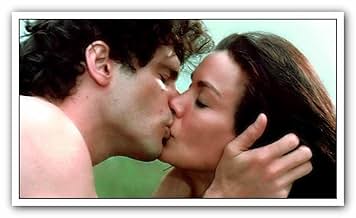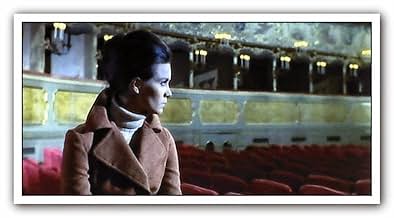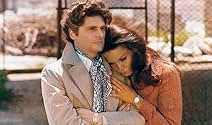PUNTUACIÓN EN IMDb
6,8/10
1 mil
TU PUNTUACIÓN
Sin mencionar el motivo, el músico veneciano Enrico invita a su ex esposa Valeria a visitarlo, y su corazón vuelve a romperse durante sus últimos días juntos.Sin mencionar el motivo, el músico veneciano Enrico invita a su ex esposa Valeria a visitarlo, y su corazón vuelve a romperse durante sus últimos días juntos.Sin mencionar el motivo, el músico veneciano Enrico invita a su ex esposa Valeria a visitarlo, y su corazón vuelve a romperse durante sus últimos días juntos.
- Premios
- 4 premios y 3 nominaciones en total
Argumento
¿Sabías que...?
- CuriosidadesBoth Tony Musante and Florinda Bolkan had all their dialogue re-dubbed, since neither was a native Italian speaker; Musante was American and Bolkan is Brazilian.
- PifiasWithin the first 5 minutes of the movie, the clocks at the station show different hours: 7:50 while Enrico is smelling the flowers, 9:25 when the train arrives and 6:40 when Valeria and Enrico leave the station.
- Versiones alternativasIn Spain the movie has more than 3 minutes excised off. This version is still the one shown on TV and Home Video. It has one full scene missing (the one with Musante playing a game with a bunch of school boys), brief cuts concerning glimpses of nudity and an abrupt cut when the couple walk through the train station at the very beginning.
- ConexionesReferenced in Brasil em Cannes (1971)
- Banda sonoraLa 5ª Sinfonia di Beethoven
Composed by Ludwig van Beethoven (as Beethoven)
Conducted by Giorgio Gaslini
Reseña destacada
What we see here is a rather strong, yet very human, representation of how love truly operates in many people's lives: It sinks its claws into one's essence, making him/her or both leery about what such love could bring and how it could evolve itself. I'm talking about fear, fear of abandonment, being cognizant of the fact that, unfortunately, many situations do not last forever.
The above comment was by me laid out mimicking Enrico's cynicism, not only because of his terminal disease, but due to his awareness of what explained above. Their love explodes, rather than blossoming, a true love I shall say, the love two persons are ready to promise to each other no matter what the odds in life may be. Unluckily for many, such drive (which was not sexual on either side in my opinion) walks its path along with an unwanted travel mate, fear, which deals its lethal blows to a lot of relationships due to past wounds and human vulnerability.
Valeria, notwithstanding her "so-called" new life, shows her devotion to Enrico throughout the entire movie, accepting his behavior, knowing what that really means, knowing that he was acting out of pain, sorrow and FEAR. After all. at one point in the movie, as he angrily throws his briefcase up in the air after disclosing his doom to Valeria, Enrico does say "All of this is happening and I should not be scared?".
Through Salerno's camera, Tony Musante portrays, via his character, the filth and mud he says Venice is made of, a city that sank in the water a very long time before; he admits, by way of his actions and words, to have become part of that squalid scene.
Being human though also implies hope, current or lost that it may be, which we notice only once when he says "There's still a lot of poetry in life" before taking Valeria to purchase a brocade tailor made dress. I won't comment on his citation of Proust Unlike (always in my opinion)Morricone, Stelvio Cipriani creates more of a one-to-one musical situation in the movies accompanied by its scores (e.g., L'ultima neve di primavera, Dov'è Anna et al), where the sounds, always rather somber, act as a narrator while the characters perform.
Musante and Bolkan were a perfect match, as their figures portray "Man and Woman", with every related quirk and problem, underpinned, however, by a love that will never end. Valeria realizes he really always loved her once it becomes obvious to her that he really needed to see her before dying, also when he prompts her to go before missing her last train to Ferrara. Sadly for her, the train she really missed had left Venice 7 years before from a track that only brought it back to her for a few hours that day only, to see it depart again, this time, toward a point of no return.
Valeria will carry on painfully, as she truly always loved Enrico.
The above comment was by me laid out mimicking Enrico's cynicism, not only because of his terminal disease, but due to his awareness of what explained above. Their love explodes, rather than blossoming, a true love I shall say, the love two persons are ready to promise to each other no matter what the odds in life may be. Unluckily for many, such drive (which was not sexual on either side in my opinion) walks its path along with an unwanted travel mate, fear, which deals its lethal blows to a lot of relationships due to past wounds and human vulnerability.
Valeria, notwithstanding her "so-called" new life, shows her devotion to Enrico throughout the entire movie, accepting his behavior, knowing what that really means, knowing that he was acting out of pain, sorrow and FEAR. After all. at one point in the movie, as he angrily throws his briefcase up in the air after disclosing his doom to Valeria, Enrico does say "All of this is happening and I should not be scared?".
Through Salerno's camera, Tony Musante portrays, via his character, the filth and mud he says Venice is made of, a city that sank in the water a very long time before; he admits, by way of his actions and words, to have become part of that squalid scene.
Being human though also implies hope, current or lost that it may be, which we notice only once when he says "There's still a lot of poetry in life" before taking Valeria to purchase a brocade tailor made dress. I won't comment on his citation of Proust Unlike (always in my opinion)Morricone, Stelvio Cipriani creates more of a one-to-one musical situation in the movies accompanied by its scores (e.g., L'ultima neve di primavera, Dov'è Anna et al), where the sounds, always rather somber, act as a narrator while the characters perform.
Musante and Bolkan were a perfect match, as their figures portray "Man and Woman", with every related quirk and problem, underpinned, however, by a love that will never end. Valeria realizes he really always loved her once it becomes obvious to her that he really needed to see her before dying, also when he prompts her to go before missing her last train to Ferrara. Sadly for her, the train she really missed had left Venice 7 years before from a track that only brought it back to her for a few hours that day only, to see it depart again, this time, toward a point of no return.
Valeria will carry on painfully, as she truly always loved Enrico.
- mdefranc
- 2 mar 2010
- Enlace permanente
Selecciones populares
Inicia sesión para calificar y añadir a tu lista para recibir recomendaciones personalizadas
- How long is The Anonymous Venetian?Con tecnología de Alexa
Detalles
- Duración1 hora 31 minutos
- Mezcla de sonido
Contribuir a esta página
Sugerir un cambio o añadir el contenido que falta

Principal laguna de datos
By what name was Anónimo veneciano (1970) officially released in India in English?
Responde








